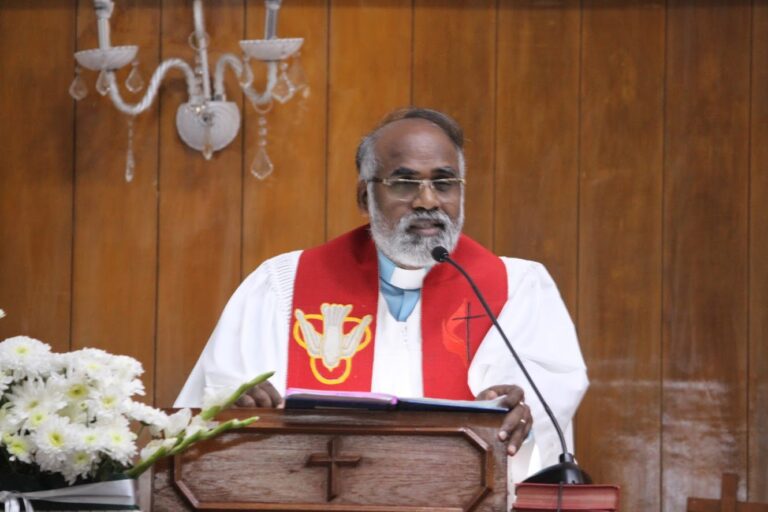
Message by the Senior Pastor
Rev. Dr. Andrew B. Natarajan

June 2025
Dear All,
Greetings in the name of the Holy Triune God!
This month, we will reflect on the Person of the Holy Spirit. Male expressions are traditionally used when describing the Trinity. The Holy Spirit is also known by many other names, including the Holy Ghost, Spirit of God, Spirit of the Lord, Spirit of Truth, the Comforter, the Counsellor, and the Sanctifier. He is sometimes symbolized as a Dove, recalling the moment when He descended upon Christ in this form at the Jordan River (Mark 1:10). Though distinct from the Father and the Son, the Holy Spirit is coequal and coeternal with them. Through what is called a “single aspiration,” the Holy Spirit proceeds from both the Father and the Son, as from one shared source.
The Hebrew term ruʹach and the Greek word pneuʹma, which relate to God’s active force, or Holy Spirit, are the sources of the English word “spirit.” Rûah is a Hebrew term that can also be rendered as wind, breath, mind, or the spirit. It is also written as ruach, ruakh, ru‘ah, and ruwach in English translations. Jesus embodied the Holy Spirit in the Gospel of John by acting as a guide and a pa·raʹkle·tos. In John 16:7–15, Jesus employed masculine personal pronouns, but according to John 14:16–17, the term “pneuʹma” is employed as the genderless pronoun “it.”
The wind and breath are invisible, and so the Spirit of God is invisible. Wind is powerful and God’s Spirit is powerful. Everything that happens between God and humanity happens through the work of the Holy Spirit. He speaks, hears, declares, glorifies, and receives. The Holy Spirit gives people the power to do what God wants. The Holy Spirit is the divine, living energy active in the world and in our hearts, providing intimacy with the Father and the Son, conveying God’s thoughts to us as well as teaching and reminding us of what we need to know and do (John 14:26, 15:26, 16:12-15; Act 2:17, 19:6; Ephesians 3:22).
God’s Ruakh (Spirit) empowers individuals uniquely for specific tasks.. Joseph was given the ability to comprehend and analyse dreams by the Spirit of God. In order to create lovely things in the tabernacle, the artist Bezalel was bestowed with knowledge, abilities, and creative genius. However, the Holy Spirit only worked through a small number of chosen people at different points in the Old Testament (Genesis 1:2; Exodus 35:30–33; 1 Samuel 10:6), but His mission has gained prominence since His outpouring on the day of Pentecost and beyond. He is now constantly present in every believer (Acts 2:1–13; Joel 2:28, 29).
One of the most important characters in the Bible is the Spirit of God, who stands for the authority and presence of God. The Spirit has been involved in creation since the beginning (Genesis 1:2). Throughout the Old and New Testaments, the Holy Spirit is involved in empowering leaders, inspiring prophets, and leading God’s people. Spiritual rebirth is a core belief in Christianity. Believers undergo regeneration—a metamorphosis that results in new life—through the operation of the Holy Spirit (John 3:3).
The Holy Spirit bestows spiritual gifts upon believers for the edification of the church and the advancement of God’s kingdom. These gifts are diverse, including wisdom, knowledge, faith, healing, prophecy, and more, as outlined in 1 Corinthians 12:4-11. The Bible acknowledges the reality of spiritual warfare and calls us to stand firm against the forces of evil (Ephesians 6:12). The fruit of the Spirit—love, joy, peace, patience, kindness, goodness, faithfulness, gentleness, and self-control—is a sign that the Holy Spirit is present in a believer’s life (Galatians 5:22–23). The Spirit—who leads, empowers, and sanctifies God’s people for His purpose—is a reality experienced both personally and collectively.
With Blessings
Rev. Dr. Andrew B Natarajan
